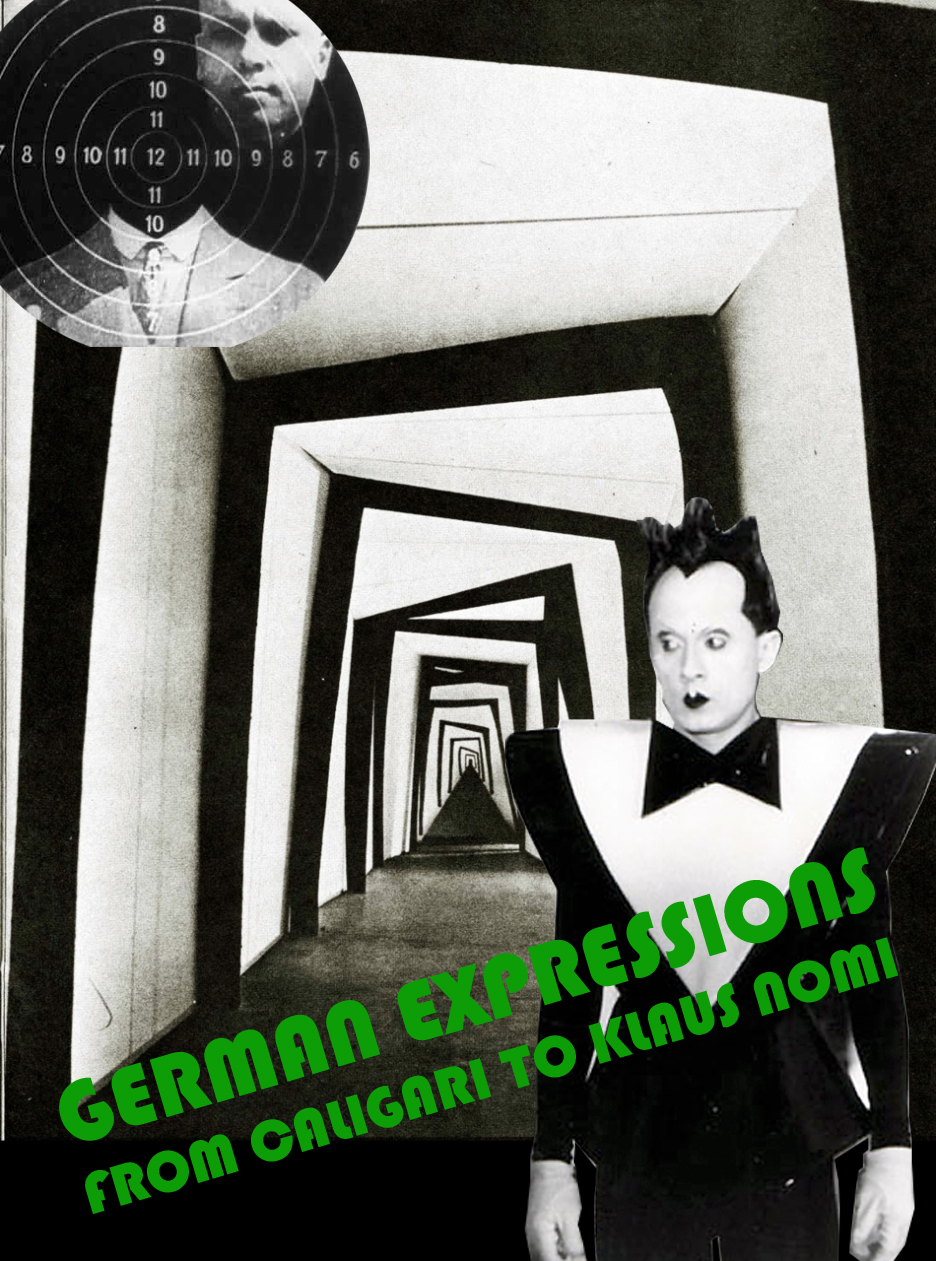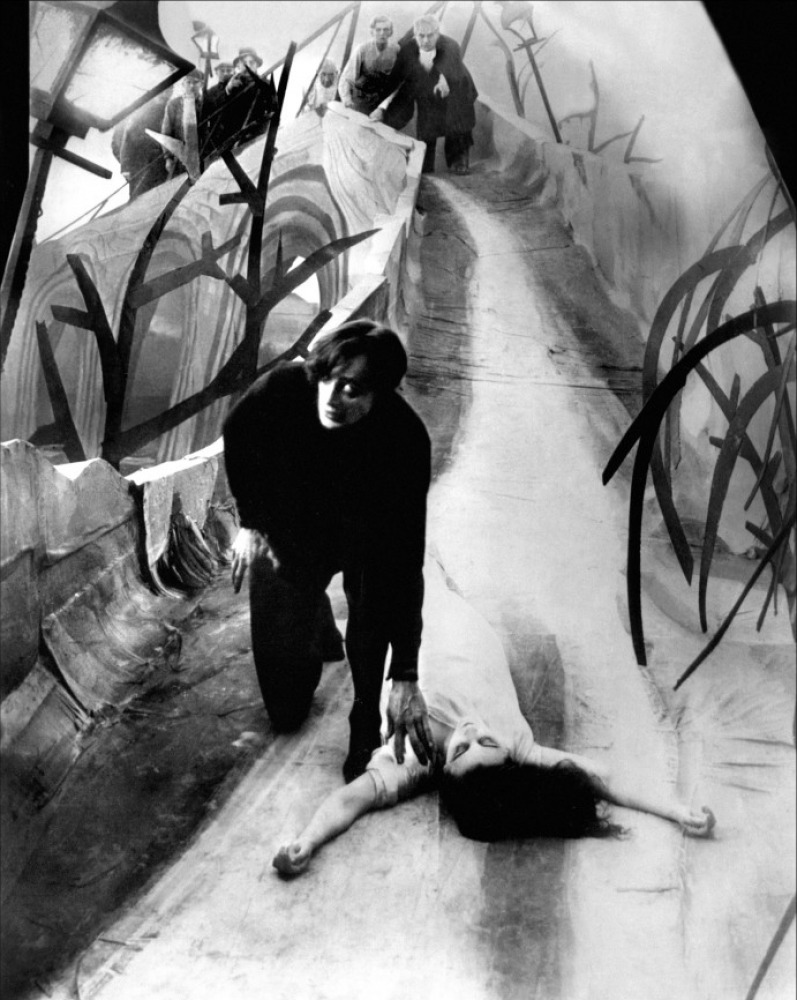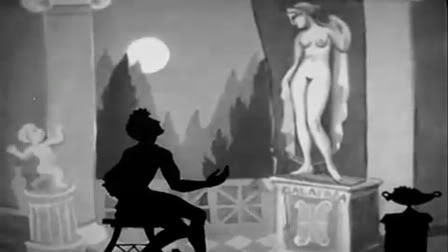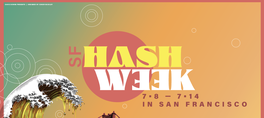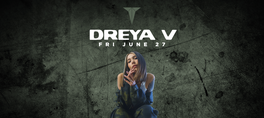Oddball Films presents German Expressions, a program of gems of German cinema, as well as rarities from German performers, artists and visionaries from the 1920s-1970s. Through an excerpt of The Cabinet of Dr. Caligari (1920), witness the innovation and creativity that set Germany apart from the realism of early cinema and influenced nearly 100 years of film. It may be a little late for the Olympic tie in, but Leni Riefenstahl's Olympia Diving Sequence (1936) endures as one of the most breathtaking documents of the beauty of the human form throughout cinema history. Silhouette animator Lotte Reiniger offers two of the most exquisite and intricate of her shorter films, The Magic Horse (1953) and Galathea: Das Lebende Marmorbild (1935). Sultry ex-patriate Marlene Dietrich entertained our troops during the war and in a musical sequence from Billy Wilder's A Foreign Affair (1948), she entertains the crowd by singing a cheeky song about the Black Market in a post-war world. Between the wars, Germany birthed the Dada movement; its irreverent and anarchical style is captured perfectly in the eye-popping Germany-DADA: An Alphabet of German DADAism (1968). New-Wave opera star Klaus Nomi delivers one of his signature arias in a dream sequence from the bizarre cult-classic M*ster M*ke's Mondo V*deo (1979). Plus dazzling excerpts from two groundbreaking artists Richter on Film (1972) and Mary Wigman: When the Fire Dances between Two Poles (1993) as well as clips of contemporary West German artists in Deutschland Spiegel: The German Scene (1970). Everything will be screened on 16mm film from the archive and pretzels will be provided, but BYOB (Bring your own Bratwurst).
Date: Thursday, March 6th, 2014 at 8:00 pm
Venue: Oddball Films, 275 Capp Street San Francisco
Admission: $10.00 Limited Seating RSVP to [email protected] or (415) 558-8117
Web: http://oddballfilms.blogspot.com/2014/02/german-expressions-from-caligari-to.html
Featuring:
Olympia Diving Sequence (B+W, 1936)
Leni Riefenstahl’s Olympia documents the Olympic games of 1936, using disorienting angles and slow motion in order to display athletic bodies in motion, detached from all purpose. In 1936, at Hitler's behest, she filmed the Berlin Olympics. She used more than 40 cameramen, shot 250 miles of film and spent 18 months in the cutting room. The Olympia Diving Sequence is a supreme example of editing where physics are transcended and somehow weightlessness is achieved. This film, despite its overtly Aryan leanings is also a celebration of the human form. Film critic Pauline Kael called Triumph and Olympia the two greatest films ever directed by a woman. Often it’s unclear where the bodies are in the context of their environment, which allows the film to focus on their pure, Adonis-like form. Riefenstahl’s film captured the body-centric culture cultivated by the rise of fascism, and made it into an aesthetic principle.
The Magic Horse (B+W, 1953)
Lotte Reiniger, fascinated with Chinese silhouette puppetry, was the first to create a feature length animated film, the Adventures of Prince Achmed (1926). Her paper cut- outs are phenomenally intricate and lush, with dreamlike imagery and unlike any other form of animation. This short is from a series of fairy tales she completed in the 50’s, and is a further continuation of the Prince Achmed stories.
Galathea: Das Lebende Marmorbild (B+W, 1935)
In this playful rendition of the Pygmalion myth, Reiniger gets meta: as Pygmalion’s inanimate sculpture comes to life by the unseen hand of Aphrodite, so Reinger bestows her paper cutouts with fluidly graceful movement, with life! And (if this metaphor may be stretched little further), as Pygmalion falls in love with Galathea, so, too, do we with this film.
Black Market from Foreign Affair (B+W, 1948)
Sultry and cheeky Marlene Dietrich, who herself defected from Nazi Germany and often entertained the US Troops, stars as a canteen singer in an excerpt from Billy Wilder's A Foreign Affair. In this timely tune, Dietrich sings "Black Market" about the trading of family treasures for food in a grim, post-war world. "You take art, I'll take SPAM".
Germany-DADA: An Alphabet of German DADAism (Color and B+W, 1968, excerpt)
Produced and directed by Helmut Herbst.
In post-World War I Zurich, out of the conflict's sobering aftermath, there was born an artistic movement that preached an anti-establishment, anarchistic, baffling, radical-yet-whimsical philosophy of creativity. Ridiculing traditional ideas of form and beauty in the accepted arts, random and meaningless by definition, calculatedly irrational by design, the movement spread like revolt to America and across Europe, voicing the delightfully bizarre protest of a brave new community of artists and writers. Featuring painter and sound artists like Kurt Schwitters, satirist George Groz, Hans Arp, Max Ernst and many, many influential figures in the movement. Filmed with the cooperation of original Dadaists Hans Richter and Richard Hulsenbeck, this unique motion picture collage of art, music and poetry is not only an alphabet of German Dadaism, but is in itself, a true Dadaist experience.
Cabinet of Dr. Caligari (B+W, 1920, excerpt)
The imaginative stuff of nightmares. This twisted masterpiece of German Expressionism set the tone for a new form of cinema; one of odd angles, hand-painted surreal sets and an undercurrent of dread.
Klaus Nomi from Mi$ter Mike'$ Mondo V*deo (Color, 1979)
German new-wave opera star Klaus Nomi performs an aria during one of the surreal dream sequences in this bizarre featurette.
Conceived by SNL writer Michael O'Donohue as a spoof on 1960's shock documentaries and intended to air on television, it was deemed too over-the-top and offensive by network executives. Eventually released as a short feature film where it became a midnight-movie staple, the origin of this print is a mystery and contains slugs for commercials. Could this be the original program intended for late night TV in 1979?
When the Fire Dances Between the Two Poles: Mary Wigman (B+W, 1991, excerpt)
Mary Wigman was a German dancer, choreographer, and dance instructor, she is considered one of the most important figures in European dance history. Wigman's choreography often employed percussion, masks, ecstatic spinning, and choral movement.
Richter on Film (Color, 1972)
The brilliant German painter, Dadaist and abstract/avant garde filmmaker Hans Richter talks about his experimental films of the 1920's. Excerpts from Rhythm 2 (1921), Race Symphony (1928), and Ghosts Before Breakfast(1927) are included. German-born Richter moved from Switzerland to the United States in 1940 and taught in the Institute of Film Techniques at the City College of New York. While living in New York, Richter directed two feature films, Dreams That Money Can Buy(1947) and 8 x 8: A Chess Sonata in 8 Movements (1957) in collaboration with Max Ernst, Jean Cocteau, Paul Bowles, Fernand Léger, Alexander Calder, Marcel Duchamp, and others. In 1957, he finished a film entitled Dadascope with original poems and prose spoken by their creators: Hans Arp, Marcel Duchamp, Raoul Hausmann, Richard Huelsenbeck, and Kurt Schwitters. Richter was also the author of a first-hand account of the Dada movement titled Dada: Art and Anti-Art which also included his reflections on the emerging Neo-Dada artworks.
About Oddball Films
Oddball films is the film component of Oddball Film+Video, a stock footage company providing offbeat and unusual film footage for feature films like Milk, documentaries like The Summer of Love, television programs like Mythbusters, clips for Boing Boing and web projects around the world.
Our films are almost exclusively drawn from our collection of over 50,000 16mm prints of animation, commercials, educational films, feature films, movie trailers, medical, industrial military, news out-takes and every genre in between. We’re actively working to present rarely screened genres of cinema as well as avant-garde and ethno-cultural documentaries, which expand the boundaries of cinema. Oddball Films is the largest film archive in Northern California and one of the most unusual private collections in the US. We invite you to join us in our weekly offerings of offbeat cinema.
show less
Date: Thursday, March 6th, 2014 at 8:00 pm
Venue: Oddball Films, 275 Capp Street San Francisco
Admission: $10.00 Limited Seating RSVP to [email protected] or (415) 558-8117
Web: http://oddballfilms.blogspot.com/2014/02/german-expressions-from-caligari-to.html
Featuring:
Olympia Diving Sequence (B+W, 1936)
Leni Riefenstahl’s Olympia documents the Olympic games of 1936, using disorienting angles and slow motion in order to display athletic bodies in motion, detached from all purpose. In 1936, at Hitler's behest, she filmed the Berlin Olympics. She used more than 40 cameramen, shot 250 miles of film and spent 18 months in the cutting room. The Olympia Diving Sequence is a supreme example of editing where physics are transcended and somehow weightlessness is achieved. This film, despite its overtly Aryan leanings is also a celebration of the human form. Film critic Pauline Kael called Triumph and Olympia the two greatest films ever directed by a woman. Often it’s unclear where the bodies are in the context of their environment, which allows the film to focus on their pure, Adonis-like form. Riefenstahl’s film captured the body-centric culture cultivated by the rise of fascism, and made it into an aesthetic principle.
The Magic Horse (B+W, 1953)
Lotte Reiniger, fascinated with Chinese silhouette puppetry, was the first to create a feature length animated film, the Adventures of Prince Achmed (1926). Her paper cut- outs are phenomenally intricate and lush, with dreamlike imagery and unlike any other form of animation. This short is from a series of fairy tales she completed in the 50’s, and is a further continuation of the Prince Achmed stories.
Galathea: Das Lebende Marmorbild (B+W, 1935)
In this playful rendition of the Pygmalion myth, Reiniger gets meta: as Pygmalion’s inanimate sculpture comes to life by the unseen hand of Aphrodite, so Reinger bestows her paper cutouts with fluidly graceful movement, with life! And (if this metaphor may be stretched little further), as Pygmalion falls in love with Galathea, so, too, do we with this film.
Black Market from Foreign Affair (B+W, 1948)
Sultry and cheeky Marlene Dietrich, who herself defected from Nazi Germany and often entertained the US Troops, stars as a canteen singer in an excerpt from Billy Wilder's A Foreign Affair. In this timely tune, Dietrich sings "Black Market" about the trading of family treasures for food in a grim, post-war world. "You take art, I'll take SPAM".
Germany-DADA: An Alphabet of German DADAism (Color and B+W, 1968, excerpt)
Produced and directed by Helmut Herbst.
In post-World War I Zurich, out of the conflict's sobering aftermath, there was born an artistic movement that preached an anti-establishment, anarchistic, baffling, radical-yet-whimsical philosophy of creativity. Ridiculing traditional ideas of form and beauty in the accepted arts, random and meaningless by definition, calculatedly irrational by design, the movement spread like revolt to America and across Europe, voicing the delightfully bizarre protest of a brave new community of artists and writers. Featuring painter and sound artists like Kurt Schwitters, satirist George Groz, Hans Arp, Max Ernst and many, many influential figures in the movement. Filmed with the cooperation of original Dadaists Hans Richter and Richard Hulsenbeck, this unique motion picture collage of art, music and poetry is not only an alphabet of German Dadaism, but is in itself, a true Dadaist experience.
Cabinet of Dr. Caligari (B+W, 1920, excerpt)
The imaginative stuff of nightmares. This twisted masterpiece of German Expressionism set the tone for a new form of cinema; one of odd angles, hand-painted surreal sets and an undercurrent of dread.
Klaus Nomi from Mi$ter Mike'$ Mondo V*deo (Color, 1979)
German new-wave opera star Klaus Nomi performs an aria during one of the surreal dream sequences in this bizarre featurette.
Conceived by SNL writer Michael O'Donohue as a spoof on 1960's shock documentaries and intended to air on television, it was deemed too over-the-top and offensive by network executives. Eventually released as a short feature film where it became a midnight-movie staple, the origin of this print is a mystery and contains slugs for commercials. Could this be the original program intended for late night TV in 1979?
When the Fire Dances Between the Two Poles: Mary Wigman (B+W, 1991, excerpt)
Mary Wigman was a German dancer, choreographer, and dance instructor, she is considered one of the most important figures in European dance history. Wigman's choreography often employed percussion, masks, ecstatic spinning, and choral movement.
Richter on Film (Color, 1972)
The brilliant German painter, Dadaist and abstract/avant garde filmmaker Hans Richter talks about his experimental films of the 1920's. Excerpts from Rhythm 2 (1921), Race Symphony (1928), and Ghosts Before Breakfast(1927) are included. German-born Richter moved from Switzerland to the United States in 1940 and taught in the Institute of Film Techniques at the City College of New York. While living in New York, Richter directed two feature films, Dreams That Money Can Buy(1947) and 8 x 8: A Chess Sonata in 8 Movements (1957) in collaboration with Max Ernst, Jean Cocteau, Paul Bowles, Fernand Léger, Alexander Calder, Marcel Duchamp, and others. In 1957, he finished a film entitled Dadascope with original poems and prose spoken by their creators: Hans Arp, Marcel Duchamp, Raoul Hausmann, Richard Huelsenbeck, and Kurt Schwitters. Richter was also the author of a first-hand account of the Dada movement titled Dada: Art and Anti-Art which also included his reflections on the emerging Neo-Dada artworks.
About Oddball Films
Oddball films is the film component of Oddball Film+Video, a stock footage company providing offbeat and unusual film footage for feature films like Milk, documentaries like The Summer of Love, television programs like Mythbusters, clips for Boing Boing and web projects around the world.
Our films are almost exclusively drawn from our collection of over 50,000 16mm prints of animation, commercials, educational films, feature films, movie trailers, medical, industrial military, news out-takes and every genre in between. We’re actively working to present rarely screened genres of cinema as well as avant-garde and ethno-cultural documentaries, which expand the boundaries of cinema. Oddball Films is the largest film archive in Northern California and one of the most unusual private collections in the US. We invite you to join us in our weekly offerings of offbeat cinema.
Oddball Films presents German Expressions, a program of gems of German cinema, as well as rarities from German performers, artists and visionaries from the 1920s-1970s. Through an excerpt of The Cabinet of Dr. Caligari (1920), witness the innovation and creativity that set Germany apart from the realism of early cinema and influenced nearly 100 years of film. It may be a little late for the Olympic tie in, but Leni Riefenstahl's Olympia Diving Sequence (1936) endures as one of the most breathtaking documents of the beauty of the human form throughout cinema history. Silhouette animator Lotte Reiniger offers two of the most exquisite and intricate of her shorter films, The Magic Horse (1953) and Galathea: Das Lebende Marmorbild (1935). Sultry ex-patriate Marlene Dietrich entertained our troops during the war and in a musical sequence from Billy Wilder's A Foreign Affair (1948), she entertains the crowd by singing a cheeky song about the Black Market in a post-war world. Between the wars, Germany birthed the Dada movement; its irreverent and anarchical style is captured perfectly in the eye-popping Germany-DADA: An Alphabet of German DADAism (1968). New-Wave opera star Klaus Nomi delivers one of his signature arias in a dream sequence from the bizarre cult-classic M*ster M*ke's Mondo V*deo (1979). Plus dazzling excerpts from two groundbreaking artists Richter on Film (1972) and Mary Wigman: When the Fire Dances between Two Poles (1993) as well as clips of contemporary West German artists in Deutschland Spiegel: The German Scene (1970). Everything will be screened on 16mm film from the archive and pretzels will be provided, but BYOB (Bring your own Bratwurst).
Date: Thursday, March 6th, 2014 at 8:00 pm
Venue: Oddball Films, 275 Capp Street San Francisco
Admission: $10.00 Limited Seating RSVP to [email protected] or (415) 558-8117
Web: http://oddballfilms.blogspot.com/2014/02/german-expressions-from-caligari-to.html
Featuring:
Olympia Diving Sequence (B+W, 1936)
Leni Riefenstahl’s Olympia documents the Olympic games of 1936, using disorienting angles and slow motion in order to display athletic bodies in motion, detached from all purpose. In 1936, at Hitler's behest, she filmed the Berlin Olympics. She used more than 40 cameramen, shot 250 miles of film and spent 18 months in the cutting room. The Olympia Diving Sequence is a supreme example of editing where physics are transcended and somehow weightlessness is achieved. This film, despite its overtly Aryan leanings is also a celebration of the human form. Film critic Pauline Kael called Triumph and Olympia the two greatest films ever directed by a woman. Often it’s unclear where the bodies are in the context of their environment, which allows the film to focus on their pure, Adonis-like form. Riefenstahl’s film captured the body-centric culture cultivated by the rise of fascism, and made it into an aesthetic principle.
The Magic Horse (B+W, 1953)
Lotte Reiniger, fascinated with Chinese silhouette puppetry, was the first to create a feature length animated film, the Adventures of Prince Achmed (1926). Her paper cut- outs are phenomenally intricate and lush, with dreamlike imagery and unlike any other form of animation. This short is from a series of fairy tales she completed in the 50’s, and is a further continuation of the Prince Achmed stories.
Galathea: Das Lebende Marmorbild (B+W, 1935)
In this playful rendition of the Pygmalion myth, Reiniger gets meta: as Pygmalion’s inanimate sculpture comes to life by the unseen hand of Aphrodite, so Reinger bestows her paper cutouts with fluidly graceful movement, with life! And (if this metaphor may be stretched little further), as Pygmalion falls in love with Galathea, so, too, do we with this film.
Black Market from Foreign Affair (B+W, 1948)
Sultry and cheeky Marlene Dietrich, who herself defected from Nazi Germany and often entertained the US Troops, stars as a canteen singer in an excerpt from Billy Wilder's A Foreign Affair. In this timely tune, Dietrich sings "Black Market" about the trading of family treasures for food in a grim, post-war world. "You take art, I'll take SPAM".
Germany-DADA: An Alphabet of German DADAism (Color and B+W, 1968, excerpt)
Produced and directed by Helmut Herbst.
In post-World War I Zurich, out of the conflict's sobering aftermath, there was born an artistic movement that preached an anti-establishment, anarchistic, baffling, radical-yet-whimsical philosophy of creativity. Ridiculing traditional ideas of form and beauty in the accepted arts, random and meaningless by definition, calculatedly irrational by design, the movement spread like revolt to America and across Europe, voicing the delightfully bizarre protest of a brave new community of artists and writers. Featuring painter and sound artists like Kurt Schwitters, satirist George Groz, Hans Arp, Max Ernst and many, many influential figures in the movement. Filmed with the cooperation of original Dadaists Hans Richter and Richard Hulsenbeck, this unique motion picture collage of art, music and poetry is not only an alphabet of German Dadaism, but is in itself, a true Dadaist experience.
Cabinet of Dr. Caligari (B+W, 1920, excerpt)
The imaginative stuff of nightmares. This twisted masterpiece of German Expressionism set the tone for a new form of cinema; one of odd angles, hand-painted surreal sets and an undercurrent of dread.
Klaus Nomi from Mi$ter Mike'$ Mondo V*deo (Color, 1979)
German new-wave opera star Klaus Nomi performs an aria during one of the surreal dream sequences in this bizarre featurette.
Conceived by SNL writer Michael O'Donohue as a spoof on 1960's shock documentaries and intended to air on television, it was deemed too over-the-top and offensive by network executives. Eventually released as a short feature film where it became a midnight-movie staple, the origin of this print is a mystery and contains slugs for commercials. Could this be the original program intended for late night TV in 1979?
When the Fire Dances Between the Two Poles: Mary Wigman (B+W, 1991, excerpt)
Mary Wigman was a German dancer, choreographer, and dance instructor, she is considered one of the most important figures in European dance history. Wigman's choreography often employed percussion, masks, ecstatic spinning, and choral movement.
Richter on Film (Color, 1972)
The brilliant German painter, Dadaist and abstract/avant garde filmmaker Hans Richter talks about his experimental films of the 1920's. Excerpts from Rhythm 2 (1921), Race Symphony (1928), and Ghosts Before Breakfast(1927) are included. German-born Richter moved from Switzerland to the United States in 1940 and taught in the Institute of Film Techniques at the City College of New York. While living in New York, Richter directed two feature films, Dreams That Money Can Buy(1947) and 8 x 8: A Chess Sonata in 8 Movements (1957) in collaboration with Max Ernst, Jean Cocteau, Paul Bowles, Fernand Léger, Alexander Calder, Marcel Duchamp, and others. In 1957, he finished a film entitled Dadascope with original poems and prose spoken by their creators: Hans Arp, Marcel Duchamp, Raoul Hausmann, Richard Huelsenbeck, and Kurt Schwitters. Richter was also the author of a first-hand account of the Dada movement titled Dada: Art and Anti-Art which also included his reflections on the emerging Neo-Dada artworks.
About Oddball Films
Oddball films is the film component of Oddball Film+Video, a stock footage company providing offbeat and unusual film footage for feature films like Milk, documentaries like The Summer of Love, television programs like Mythbusters, clips for Boing Boing and web projects around the world.
Our films are almost exclusively drawn from our collection of over 50,000 16mm prints of animation, commercials, educational films, feature films, movie trailers, medical, industrial military, news out-takes and every genre in between. We’re actively working to present rarely screened genres of cinema as well as avant-garde and ethno-cultural documentaries, which expand the boundaries of cinema. Oddball Films is the largest film archive in Northern California and one of the most unusual private collections in the US. We invite you to join us in our weekly offerings of offbeat cinema.
read more
Date: Thursday, March 6th, 2014 at 8:00 pm
Venue: Oddball Films, 275 Capp Street San Francisco
Admission: $10.00 Limited Seating RSVP to [email protected] or (415) 558-8117
Web: http://oddballfilms.blogspot.com/2014/02/german-expressions-from-caligari-to.html
Featuring:
Olympia Diving Sequence (B+W, 1936)
Leni Riefenstahl’s Olympia documents the Olympic games of 1936, using disorienting angles and slow motion in order to display athletic bodies in motion, detached from all purpose. In 1936, at Hitler's behest, she filmed the Berlin Olympics. She used more than 40 cameramen, shot 250 miles of film and spent 18 months in the cutting room. The Olympia Diving Sequence is a supreme example of editing where physics are transcended and somehow weightlessness is achieved. This film, despite its overtly Aryan leanings is also a celebration of the human form. Film critic Pauline Kael called Triumph and Olympia the two greatest films ever directed by a woman. Often it’s unclear where the bodies are in the context of their environment, which allows the film to focus on their pure, Adonis-like form. Riefenstahl’s film captured the body-centric culture cultivated by the rise of fascism, and made it into an aesthetic principle.
The Magic Horse (B+W, 1953)
Lotte Reiniger, fascinated with Chinese silhouette puppetry, was the first to create a feature length animated film, the Adventures of Prince Achmed (1926). Her paper cut- outs are phenomenally intricate and lush, with dreamlike imagery and unlike any other form of animation. This short is from a series of fairy tales she completed in the 50’s, and is a further continuation of the Prince Achmed stories.
Galathea: Das Lebende Marmorbild (B+W, 1935)
In this playful rendition of the Pygmalion myth, Reiniger gets meta: as Pygmalion’s inanimate sculpture comes to life by the unseen hand of Aphrodite, so Reinger bestows her paper cutouts with fluidly graceful movement, with life! And (if this metaphor may be stretched little further), as Pygmalion falls in love with Galathea, so, too, do we with this film.
Black Market from Foreign Affair (B+W, 1948)
Sultry and cheeky Marlene Dietrich, who herself defected from Nazi Germany and often entertained the US Troops, stars as a canteen singer in an excerpt from Billy Wilder's A Foreign Affair. In this timely tune, Dietrich sings "Black Market" about the trading of family treasures for food in a grim, post-war world. "You take art, I'll take SPAM".
Germany-DADA: An Alphabet of German DADAism (Color and B+W, 1968, excerpt)
Produced and directed by Helmut Herbst.
In post-World War I Zurich, out of the conflict's sobering aftermath, there was born an artistic movement that preached an anti-establishment, anarchistic, baffling, radical-yet-whimsical philosophy of creativity. Ridiculing traditional ideas of form and beauty in the accepted arts, random and meaningless by definition, calculatedly irrational by design, the movement spread like revolt to America and across Europe, voicing the delightfully bizarre protest of a brave new community of artists and writers. Featuring painter and sound artists like Kurt Schwitters, satirist George Groz, Hans Arp, Max Ernst and many, many influential figures in the movement. Filmed with the cooperation of original Dadaists Hans Richter and Richard Hulsenbeck, this unique motion picture collage of art, music and poetry is not only an alphabet of German Dadaism, but is in itself, a true Dadaist experience.
Cabinet of Dr. Caligari (B+W, 1920, excerpt)
The imaginative stuff of nightmares. This twisted masterpiece of German Expressionism set the tone for a new form of cinema; one of odd angles, hand-painted surreal sets and an undercurrent of dread.
Klaus Nomi from Mi$ter Mike'$ Mondo V*deo (Color, 1979)
German new-wave opera star Klaus Nomi performs an aria during one of the surreal dream sequences in this bizarre featurette.
Conceived by SNL writer Michael O'Donohue as a spoof on 1960's shock documentaries and intended to air on television, it was deemed too over-the-top and offensive by network executives. Eventually released as a short feature film where it became a midnight-movie staple, the origin of this print is a mystery and contains slugs for commercials. Could this be the original program intended for late night TV in 1979?
When the Fire Dances Between the Two Poles: Mary Wigman (B+W, 1991, excerpt)
Mary Wigman was a German dancer, choreographer, and dance instructor, she is considered one of the most important figures in European dance history. Wigman's choreography often employed percussion, masks, ecstatic spinning, and choral movement.
Richter on Film (Color, 1972)
The brilliant German painter, Dadaist and abstract/avant garde filmmaker Hans Richter talks about his experimental films of the 1920's. Excerpts from Rhythm 2 (1921), Race Symphony (1928), and Ghosts Before Breakfast(1927) are included. German-born Richter moved from Switzerland to the United States in 1940 and taught in the Institute of Film Techniques at the City College of New York. While living in New York, Richter directed two feature films, Dreams That Money Can Buy(1947) and 8 x 8: A Chess Sonata in 8 Movements (1957) in collaboration with Max Ernst, Jean Cocteau, Paul Bowles, Fernand Léger, Alexander Calder, Marcel Duchamp, and others. In 1957, he finished a film entitled Dadascope with original poems and prose spoken by their creators: Hans Arp, Marcel Duchamp, Raoul Hausmann, Richard Huelsenbeck, and Kurt Schwitters. Richter was also the author of a first-hand account of the Dada movement titled Dada: Art and Anti-Art which also included his reflections on the emerging Neo-Dada artworks.
About Oddball Films
Oddball films is the film component of Oddball Film+Video, a stock footage company providing offbeat and unusual film footage for feature films like Milk, documentaries like The Summer of Love, television programs like Mythbusters, clips for Boing Boing and web projects around the world.
Our films are almost exclusively drawn from our collection of over 50,000 16mm prints of animation, commercials, educational films, feature films, movie trailers, medical, industrial military, news out-takes and every genre in between. We’re actively working to present rarely screened genres of cinema as well as avant-garde and ethno-cultural documentaries, which expand the boundaries of cinema. Oddball Films is the largest film archive in Northern California and one of the most unusual private collections in the US. We invite you to join us in our weekly offerings of offbeat cinema.
show less
Date/Times:
275 Capp Street, San Francisco, CA 94110
The Best Events
Every Week in Your Inbox
From Our Sponsors
UPCOMING EVENTS
Great suggestion! We'll be in touch.
Event reviewed successfully.
